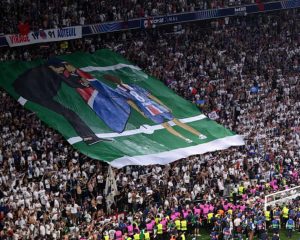
A Legendary Setback and the Journey to Reclaim the Record
The Boston Bruins are one of the most storied franchises in National Hockey League (NHL) history. Known for their relentless style of play, physical dominance, and passionate fan base, the Bruins have been home to some of the greatest players to ever grace the ice. But like any team with a long and storied legacy, the Bruins have also faced setbacks, some of which have been truly legendary. One such setback in the team’s history involved the challenge of reclaiming a record that had eluded them for years, leaving the franchise and its fans hoping for redemption.
The journey to this legendary setback can be traced back to a time when the Boston Bruins were among the elite teams in the NHL. For many, the franchise is best remembered for its success in the 1970s, particularly with the iconic presence of Bobby Orr, the defenseman who redefined the position and became synonymous with the Bruins’ legacy. However, after their peak during Orr’s tenure, the Bruins encountered years of challenges, with shifting rosters, injuries, and a growing sense of competition that made their attempts to recapture the glory days a difficult pursuit.
Despite the hurdles, the franchise remained determined. As the decades passed, the team’s commitment to rebuilding and retooling its lineup bore fruit. Yet, no matter how close they came, they could never quite reach that pinnacle again, and this elusive record became a symbol of their struggle.
The Legendary Setback: A Title That Slipped Away
A crucial turning point for the Bruins occurred during the 2010-2011 NHL season, a campaign that would end up being the most defining in the franchise’s modern history. After years of ups and downs, including close calls in the playoffs, the Bruins found themselves at the precipice of greatness again, poised to claim a long-awaited Stanley Cup title.
The 2010-2011 season was particularly important for the Bruins, as they had built a roster that was both skilled and physical, with key players like Zdeno Chara, Tim Thomas, and Patrice Bergeron. This Bruins team had all the pieces of a championship contender: a strong defense, a capable offense, and a goaltender in Tim Thomas who was playing some of the best hockey of his career. The team was built to not just compete, but to dominate.
The 2011 Stanley Cup Finals, however, were an incredible test of their resolve. The Bruins faced the Vancouver Canucks, a team that had set records for most points in a regular season and had a roster full of talent. The Canucks were expected to win, but the Bruins showed grit, perseverance, and unyielding tenacity throughout the series.
After a long, brutal battle, the Bruins were able to come out on top, winning the series 4-3 and capturing their first Stanley Cup in 39 years. This triumph was historic, not just for the Bruins, but for hockey in Boston. The city, which had been waiting decades for another championship, erupted in celebration. The victory seemed to complete the circle of a franchise once full of promise, whose glory days had been interrupted by years of uncertainty and frustration.
However, the real legendary setback came not in the triumph of winning the Stanley Cup, but in the way it led to the inevitable comparison with the teams of the past — especially the legendary 1970s Bruins squad, which had created such a strong foundation for the team. As incredible as the victory in 2011 was, the reality remained that the Bruins had to push through decades of challenges before finally breaking through again.
A Record That Stayed Out of Reach
Despite the historic nature of the 2011 Stanley Cup victory, the shadow of the franchise’s earlier successes, especially in the 1970s, still loomed large. Fans and analysts frequently referred to the Bruins’ 1972 championship as the high-water mark, and no matter how successful the modern-era Bruins were, that standard seemed impossible to meet.
The 1970s marked the Bruins’ golden era, with the team not only winning the Stanley Cup in 1970 and 1972 but also dominating the NHL with their iconic players. Led by Hall of Fame defenseman Bobby Orr, the 1970s Bruins were a force in hockey. The image of Orr flying through the air after scoring the Cup-winning goal in 1970 has since become one of the most iconic moments in the history of the sport.
While the 2011 victory was certainly an accomplishment, the reality was that the franchise had spent decades trying to reach the same heights. For much of this time, the Bruins struggled to recapture their form. They came close — sometimes agonizingly so — but the legendary setback was not just about not winning the Stanley Cup, but about trying to surpass the achievements of the past while modern hockey continued to evolve.
This was especially evident during the 2013 Stanley Cup Finals, where the Bruins found themselves in another epic showdown, this time with the Chicago Blackhawks. After leading the series 2-1, the Bruins appeared to be on their way to their second championship in three years, but a heartbreaking Game 6 loss and a dramatic comeback by the Blackhawks led to an ultimate defeat. The loss was devastating, both for the team and its fans, and served as a reminder of how elusive the ultimate prize could be, even for a team as talented as the Bruins.
The Setback That Shaped the Bruins’ Identity
What made the Bruins’ setback legendary wasn’t just the narrow misses or the inability to break the 39-year Cup drought, but how each near-miss built the character of the franchise. The team was no longer just a squad vying for a championship. They became a symbol of resilience. Every time they stumbled, the Bruins came back stronger, more determined to succeed, more determined to honor the legacy of the past.
Perhaps no player embodied this resurgence better than Tim Thomas, the goaltender who was instrumental in the Bruins’ 2011 Cup win. Thomas, who had been overlooked by many teams earlier in his career, became the face of a team that, despite setbacks, continued to fight. His play in the 2011 Stanley Cup Finals was otherworldly, as he set a record for save percentage in the postseason and was awarded the Conn Smythe Trophy as the most valuable player of the playoffs. His tenacity and determination became the blueprint for the entire team and showed that setbacks do not define a career — they shape it.
Another key figure during this era was captain Zdeno Chara, whose leadership and physicality helped define the team’s style of play. Chara, a towering presence on the ice, served as the anchor of the Bruins’ defense, and his leadership helped guide the team through the ups and downs of the 2010s. The Bruins’ identity was shaped by these setbacks — and the way they rebounded from them. For the fans, the team’s resilience was as much a part of their identity as their successes.
A New Era: The Reclamation of Legacy
As the years passed, the Bruins continued to evolve. While the 2011 Stanley Cup victory would forever remain a crowning achievement, the team began to look ahead to the future. The 2020s brought new faces to the roster, with young stars like David Pastrnak and Charlie McAvoy carrying the torch for the next generation of Bruins players.
The franchise’s identity has been shaped by those legendary setbacks, and it has embraced the challenge of reclaiming its place among the NHL’s elite. Whether they ultimately win another championship or not, the journey itself — marked by determination, heartbreak, and redemption — has solidified the Bruins’ place in hockey history.
In many ways, the setbacks were just as important as the victories. They shaped the franchise’s legacy, instilled pride in the fanbase, and ensured that the Bruins would always be remembered as a team that, no matter how many times they fell short, would always come back stronger, with a renewed commitment to success.
Conclusion: A Legendary Setback and a Lasting Legacy
The Boston Bruins’ journey has been one filled with legendary setbacks, from narrowly missing out on championships to rebuilding after years of underperformance. Yet, these setbacks are an integral part of the franchise’s story. They have forged a team that never backs down, never gives up, and always pushes forward. The 2011 Stanley Cup victory was a testament to the Bruins’ resilience, and it marked the culmination of decades of striving. While the team’s setbacks have been challenging, they have ultimately shaped the Bruins’ legacy, and their pursuit of greatness continues to inspire new generations of fans and players alike.







